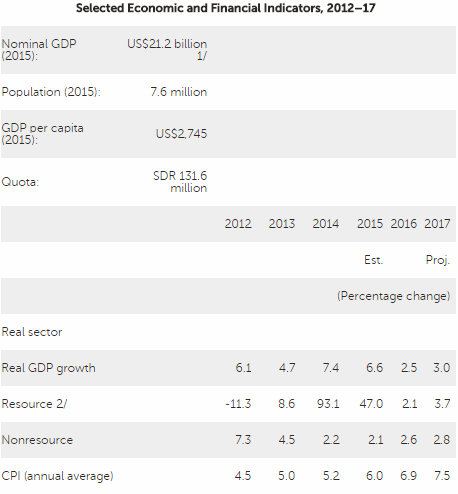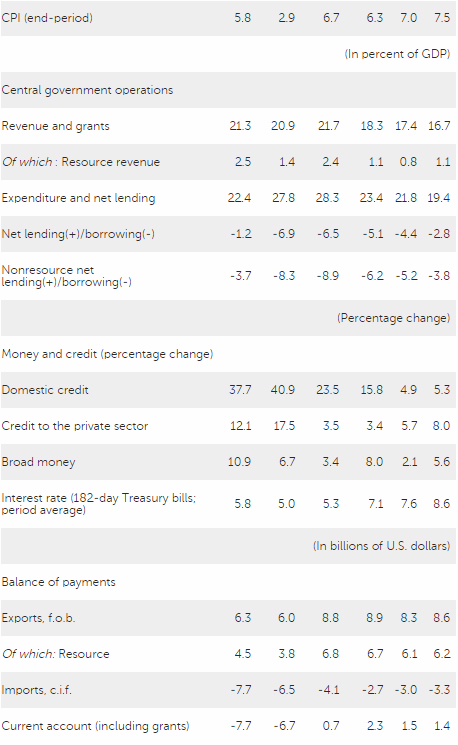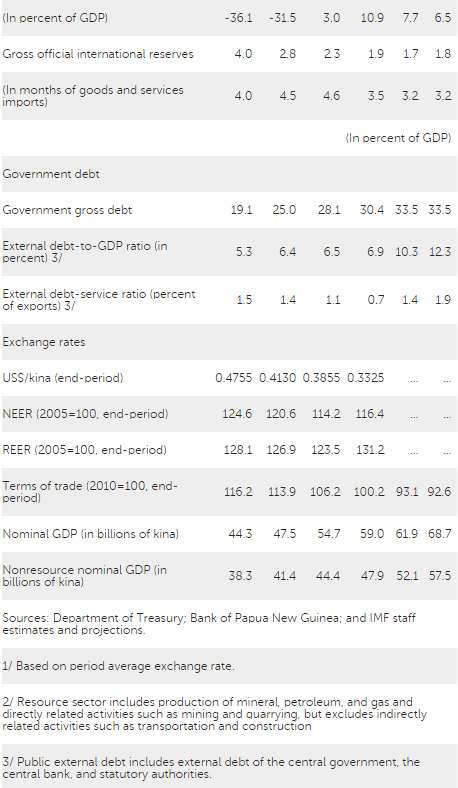IMF Executive Board Concludes 2016 Article IV Consultation with Papua New Guinea
The Executive Board of the International Monetary Fund (IMF) concluded the Article IV consultation with Papua New Guinea on November 29, 2016, and considered and endorsed the staff appraisal without a meeting on a lapse-of-time basis.
Papua New Guinea is facing headwinds stemming from low commodity prices and is recovering from a major drought, which have weighed on economic growth, weakened the external position, and created fiscal challenges. Foreign exchange (FX) remains in short supply but inflows have recently picked up somewhat, and the gross foreign reserve position is expected to remain broadly stable. Revenues fell short of the budget in response to recent commodity price declines, prompting the Parliament to pass a supplementary budget 2016 that entails expenditure cuts. Inflation has increased somewhat, partly reflecting the exchange rate depreciation.
After strong economic growth driven by the new liquefied natural gas (LNG) project coming on stream in 2014-15, the underlying growth is expected to slow down reflecting base effects following the commencement of LNG production, as well as modest growth in the non-resource sector. The large LNG exports and import compression caused by the shortage of FX led to a strong current account surplus, largely offset by financial account outflows consistent with project development agreements. Inflation is expected to continue edging upwards in the near term due to the gradual exchange rate depreciation and prices of seasonal agricultural items.
Near-term risks to the outlook are tilted to the downside, as fiscal retrenchment may have a greater impact on the economy than currently expected and the limited availability of FX continues to constrain imports and economic activity. A further drop in commodity prices would weaken the external and fiscal positions. In addition, natural disasters, climate change and weather-related shocks pose continual downside risks. Over the medium term, risks are more balanced due to the upside potential of new resource sector projects.
Executive Board Assessment
In concluding the 2016 Article IV consultation with Papua New Guinea (PNG), Executive Directors endorsed the staff’s appraisal, as follows:
As a commodity exporter, the PNG economy has been hit hard by the drop in world commodity prices and a major drought. The authorities have responded to these shocks through fiscal tightening and a combination of modest exchange rate depreciation and FX sales. Strong economic growth driven by the start of the PNG LNG project has tailed off amidst weak non-resource sector growth. Inflation has begun to pick up reflecting earlier exchange rate depreciation and increases in prices of seasonal agricultural items. Prudent macroeconomic policies are therefore essential for maintaining debt sustainability and safeguarding the external position.
Additional fiscal adjustment is needed to ensure debt sustainability over the medium term. While the authorities should be commended for promptly passing a supplementary 2016 budget, further adjustment may be needed in view of financing constraints. Passage of a prudent 2017 budget should be commended, which will facilitate continued fiscal consolidation over the medium term, anchored by the existing 30 percent public debt-to-GDP fiscal anchor. The pace of adjustment should continue to balance the need to maintain debt sustainability against the costs of excessive fiscal adjustment in terms of growth and poverty reduction.
Greater revenue mobilization would create fiscal space for expenditures that would help address PNG’s huge development and social needs. Measures drawn from the National Tax Review should be adopted going forward. In the near term, efforts should be undertaken to improve tax compliance. There is considerable scope for improving the fiscal regime for extractive industries.
Government expenditure quality should be improved through public financial management (PFM) reform. There is much scope for better deploying existing public sector resources towards effective public service delivery, including on core areas of health and education. Further PFM reforms should build upon the recently published public expenditure and financial accountability (PEFA) document and successes in rolling out the new information management system to encompass cash management issues. The sovereign wealth fund should be put into operation as soon as possible to help improve transparency and ensure that resource revenue is used in a manner that is consistent with macroeconomic stabilization and saving for future generations.
Greater exchange rate flexibility and a more efficient and transparent FX allocation mechanism are urgently needed. Lack of exchange rate flexibility has impeded PNG’s adjustment to sharply lower world commodity prices, weakened the external and fiscal positions, and reduced the growth contribution from net exports. The pass-through of more rapid exchange rate depreciation into inflation would need to be countered through monetary policy tightening but transmission channels are impeded by excessive banking system liquidity, implying the need for measures to absorb excess liquidity. Staff does not recommend Fund approval of the retention of the exchange restriction arising from FX prioritization and rationing of FX, of the tax clearance certificate requirement, and of the multiple currency practices (MCPs), because they are not temporary and in the absence of a timetable for their elimination.
An acceleration of structural reform is key for private sector development, in support of PNG’s inclusive growth strategy. The business environment, particularly for agriculture and SMEs, needs to be strengthened through providing better infrastructure, access to financing, and law and order.
While staff welcomes the recent progress, more decisive action is needed to improve macroeconomic statistics. Noteworthy progress has been made to strengthen national accounts and government finance statistics. Priorities for further reform include balance of payments, international investment position, and debt data.



Source: International Monetary Fund
- 398 reads
Human Rights
Ringing FOWPAL’s Peace Bell for the World:Nobel Peace Prize Laureates’ Visions and Actions

Protecting the World’s Cultural Diversity for a Sustainable Future

The Peace Bell Resonates at the 27th Eurasian Economic Summit

Declaration of World Day of the Power of Hope Endorsed by People in 158 Nations

Puppet Show I International Friendship Day 2020

